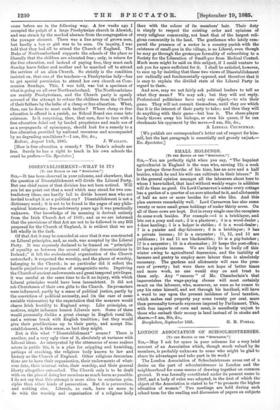DISESTABL1SHMENT—WHAT IS IT?
[To THE EDITOR OF THE " SPECTATOR." J Sia,—It has been observed in your columns, and elsewhere, that the question of Disestablishment will divide the Liberal Party. But one chief cause of that division has not been noticed. Will you let me point out that a word which may stand for two con- tradictory ideas, can hardly fail to divide honest men who are invited to adopt it as a political cry ? Disestablishment is not a. dictionary word ; it is not to be found in the pages of any philo- sophical historian ; five-and-twenty years ago it was practically unknown. Our knowledge of its meaning is derived entirely from the Irish Church Act of 1869; and as we are informed that the provisions of that Act are not to be followed in any Bill proposed for the Church of England, it is evident that we are left wholly in the dark.
Of that Act it may be conceded at once that it was constructed on Liberal principles, and, as such, was accepted by the Liberal Party. It was expressly declared to be framed on "principles of equality as between the several religions denominations in Ireland ;" it left the ecclesiastical organisation of the Church untouched ; it respected the worship, and the places of worship, belonging to the Church; in no particular did it reflect the hostile prejudices or passions of antagonistic sects. Depriving the Church of ancient endowments and great temporal privileges, it was careful at the same time to do it no injury, with which Liberal principles would have been inconsistent. It did not rob Churchmen of their own gifts to the Church. Its promoters were influenced, partly by a sense of political justice, partly by the conviction of political necessity, and (in the case of some amiable visionaries) by the expectation that the measure would charm Irish hostility to England away. Like principles, or motives, might influence honest Liberals now. Some of them would personally dislike a great change in English rural life, and a serious break with English tradition ; but they would give their predilections up to their party, and accept Dis- establishment, in this sense, as bent they might.
But is this what "Disestablishment" means ? There is another, and a very ugly view of it, absolutely at variance with Liberal ideas. As interpreted by the utterances of some zealous actors in public life, it is a plan for crippling and humbling, perhaps of crushing, the religious body known to law and history as the Church of England. Other religious denomina- tions are to have their organisation, their endowments of what- ever date, their internal rules, their worship, and their general liberty altogether untouched. The Church only is to be dealt with on the plan of doing her members as much harm as possible. I do not say that this attempt is more alien to sectarian prin. ciples than other kinds of persecution. But it is persecution, and nothing else. Liberals, as such, have no more to do with the worship and organisation of a religions body than with the colour of its members' hair. Their duty is simply to respect the existing order and opinions of every religions community, not least that of the largest rd. gone community in the land. The gentleman who lately com- pared the presence of a rector in a country parish with the existence of small-pox in the village, is no Liberal, even though he may go through the grotesque formality of subscribing to a Society for the Liberation of Small-pox from Medical Control. Much more might be said on this subject, if I could venture to ask you for space sufficient for it. I shall be satisfied, however, to sum up by insisting that these two views of Disestablishment are radically and fundamentally opposed, and therefore that it is easy to explain the divided state of the Liberal Party in regard to them.
And now, may we not fairly ask political leaders to tell us what they mean P We may ask ; but they will not reply. Professional politicians have only one object,—to win their game. They will not commit themselves, until they see which line it is the interest of their party to take ; and then they will do anything with their game—but lose it. The chess-player freely throws away his bishops, or even his queen, if he can checkmate his opponent by the move.—I am, Sir, &c., A LIBERAL CHURCHMAN.
[We publish our correspondent's letter out of respect for him- self, but the last paragraph is essentially and grossly unjust.— En. Spectator.]


































 Previous page
Previous page